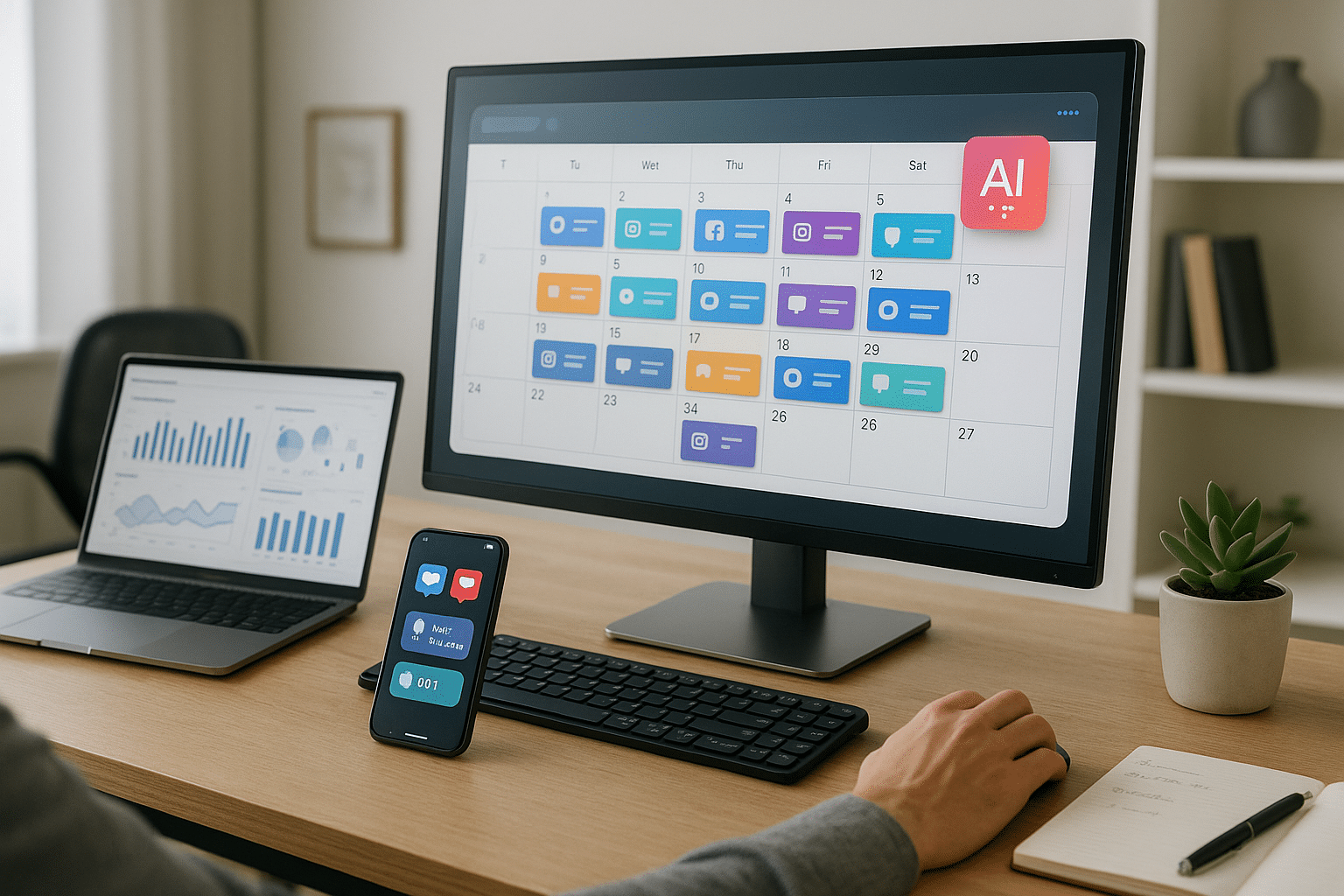And, let’s face it, manual tactics and conventional tools no longer cut it. Social media is a constantly evolving battlefield, and staying competitive means adopting technologies that fuel efficiency and performance. Among these game-changing technologies, Artificial Intelligence (AI) stands tall and promising, particularly in its application to social media calendars. 💡
In this comprehensive guide, we delve into how AI-powered calendars can revolutionize your social media strategy. Be prepared for a deep dive into AI’s transformative potential, how to leverage it in your social media management, and why you need it to stay ahead of your competition. Whether you’re a seasoned marketer or a social media novice, this article will provide valuable insights that can bring about a paradigm shift in your social media approach. 🚀
Why AI in Social Media Strategy?
The sheer volume of data generated by social media is staggering. Manual analysis of this data can be tedious and time-consuming. More importantly, it’s prone to errors and inefficiencies. Enter AI. With its ability to process and analyze large amounts of data in real-time, AI offers insights that can significantly improve your social media strategy.
Moreover, AI can automate various mundane tasks, freeing up valuable time for you to focus on strategy and creative content. It can predict trends, determine optimal posting times, and even suggest content that resonates with your audience. By integrating AI into your social media calendar, you’re not just staying afloat—you’re swimming with the current, ready to ride the wave of digital innovation. 🌊
Revolutionizing Social Media Calendars with AI
Now, you might wonder: ‘How does AI come into play in social media calendars?’ Let’s break it down.
A social media calendar is a crucial tool that helps plan, organize, and schedule posts across various platforms. However, the traditional social media calendar has its limitations. It’s often static, doesn’t adapt to changes, and lacks the capability to analyze and predict trends.
On the other hand, an AI-powered social media calendar is dynamic and responsive. It uses data analysis, machine learning algorithms, and predictive analytics to optimize your social media strategy. With such a calendar at your disposal, you’re well-equipped to create and deliver content that not only engages your audience but also drives growth. ⚡️
What’s In It for You?
What can you expect from this deep-dive guide into AI-powered social media calendars? Plenty. We’ll start by exploring the basic principles of AI and its role in social media management. Then, we’ll move on to a practical guide on how to integrate AI into your social media calendar.
Next, we’ll discuss the potential challenges you might face in this process and how to overcome them. We will then delve into real-life examples and case studies that highlight the success of AI-powered social media strategies. And finally, we’ll provide actionable tips and techniques to maximize the benefits of AI in your social media calendar.
So, buckle up and get ready to power up your social media strategy with AI. Let’s dive in and stay ahead of the game. 🎯
Introduction to AI-Powered Calendars and Social Media Strategy
In today’s digital era, having an effective social media strategy is crucial for businesses. It’s not just about posting content regularly but ensuring that the content is engaging, relevant, and timely. To stay ahead of the game, businesses are leveraging artificial intelligence (AI) to boost their social media strategies. One of the AI tools that is gaining popularity is AI-powered calendars. This article will delve into the role of AI-powered calendars in enhancing your social media strategy and keeping you ahead of the competition.
In the increasingly competitive landscape of social media, planning and scheduling content is crucial. AI-powered calendars are here to streamline this process. This technology not only assists in planning and organizing content but also provides data-driven insights to optimize the content for better engagement and reach. But what makes AI-powered calendars different from traditional digital calendars? Let’s delve into their distinctive features and how they can revolutionize your social media strategy.
AI-powered calendars leverage machine learning algorithms and predictive analytics to understand your audience behavior, analyze past performance, and provide recommendations for optimizing future posts. These calendars are designed to be intuitive and adaptable, continually learning from the data to improve accuracy and efficiency.
How AI-Powered Calendars Enhance Your Social Media Strategy
Incorporating AI-powered calendars into your social media strategy can bring several benefits. The primary advantage is automation. With AI, you can automate the process of scheduling and publishing posts, freeing up your time to focus on creating quality content.
Moreover, these AI-powered tools offer data-driven insights to improve your content strategy. They analyze your past performance, identify trends, and provide recommendations to enhance your future posts. This way, you can optimize your content for better engagement and reach.
Another advantage is personalization. AI-powered calendars understand your audience’s behavior and preferences, allowing you to tailor your content accordingly. This can significantly improve your engagement rate and help you build a strong relationship with your audience.
Table: Traditional Digital Calendars vs. AI-Powered Calendars
| Features | Traditional Digital Calendars | AI-Powered Calendars |
|---|---|---|
| Scheduling and publishing | Manual | Automated |
| Data-driven insights | No | Yes |
| Personalization | No | Yes |
Check out this video to learn more about AI-powered calendars: “How AI Can Improve Your Social Media Calendar” by the Social Media Examiner.
Choosing the Right AI-Powered Calendar for Your Business
With several AI-powered calendars available in the market, choosing the right one for your business can be overwhelming. However, the key is to understand your business needs and evaluate the features of different tools accordingly.
When selecting an AI-powered calendar, consider factors like ease of use, integration with other platforms, cost, and customer support. Additionally, check whether the tool provides detailed analytics and reporting features to track your performance.
Lastly, ensure that the tool is scalable. As your business grows, your social media strategy will also evolve. Therefore, choose a tool that can adapt to your changing needs.
AI-Powered Calendars: Top Picks
To help you in your selection process, here are some top picks for AI-powered calendars:
- Loomly: Known for its intuitive interface and robust features, Loomly not only assists in scheduling posts but also provides suggestions to improve your content.
- ContentCal: ContentCal uses AI to provide insights into your best performing content and optimal posting times.
- CoSchedule: CoSchedule leverages AI to automate your social media scheduling, giving you more time to focus on content creation.
For more insights on how to choose the right AI-powered calendar, watch this video: “Choosing the Right Social Media Management Tool” by Social Media Today.
Final Thoughts on Boosting Your Social Media Strategy with AI-Powered Calendars
In conclusion, AI-powered calendars are revolutionizing social media strategies. By automating the scheduling process, providing data-driven insights, and enabling personalization, these tools can significantly enhance your social media performance.
However, it’s important to remember that AI-powered calendars are just tools to aid your strategy. The key to a successful social media strategy still lies in creating engaging and relevant content that resonates with your audience.
So, are you ready to take your social media strategy to the next level with AI-powered calendars? The future of social media strategy is here, and it’s time to embrace it.

Conclusion
In conclusion, we have traversed an extensive journey deep into the intricacies of software engineering and IT, providing a detailed overview of the topic and engaging with the fundamental aspects of these complex areas. Let’s take a brief moment to recap the key points that we have covered in this article.
Firstly, we delved into the nature of software engineering, highlighting its pivotal role in today’s digitalized world. We explored the nuances of designing, testing, and maintaining software systems, offering an in-depth understanding of the complexities involved. We made clear how this discipline is the backbone of almost all industries, from health and education to entertainment and finance.
Next, we ventured into the world of Information Technology (IT), highlighting its enormous scope and influence. We touched upon the key components of IT, such as hardware, software, databases, and networks, and their interconnected roles in facilitating communication and processing information. Further, we explained the relevance of IT in modern business operations, not just as a tool for efficiency, but also as a strategic asset.
Throughout the article, we strived to break down complicated concepts into understandable language, ensuring that even readers without a technical background could gain a solid grasp of the topics. After all, these areas are no longer the exclusive domain of specialists but have increasingly become part of our everyday lives.
But our exploration does not end here. The fields of software engineering and IT are continually evolving, with new concepts, technologies, and applications emerging regularly. I encourage you to continue expanding your knowledge, engage in further reading, and apply what you have learned in practical ways. Whether you are a student, a professional, or just an enthusiastic learner, there is always something new to discover and understand.
Here are a few recommended readings to help you deepen your knowledge:
Software Engineering by Ian Sommerville and
Information Technology for Strategic Decision Making by M. Gordon Hunter and Felix B. Tan .
As we wrap up, I would like to reiterate the importance of understanding and appreciating the role of software engineering and IT in our world. They are not just technical disciplines but also powerful tools that shape our society and our future. So, let’s keep learning, exploring, and questioning. 👩💻🚀
Finally, your thoughts and perspectives are invaluable. Please feel free to comment and share this article. The more we engage, the more we can learn from each other.
Remember, knowledge grows when shared. So, don’t hesitate to hit the share button. 👇😊
In the ever-evolving realm of technology, it’s those who continue to learn and adapt that make the biggest impact. Let’s be those people.
Stay curious, keep learning, and until next time! 🌐💡



